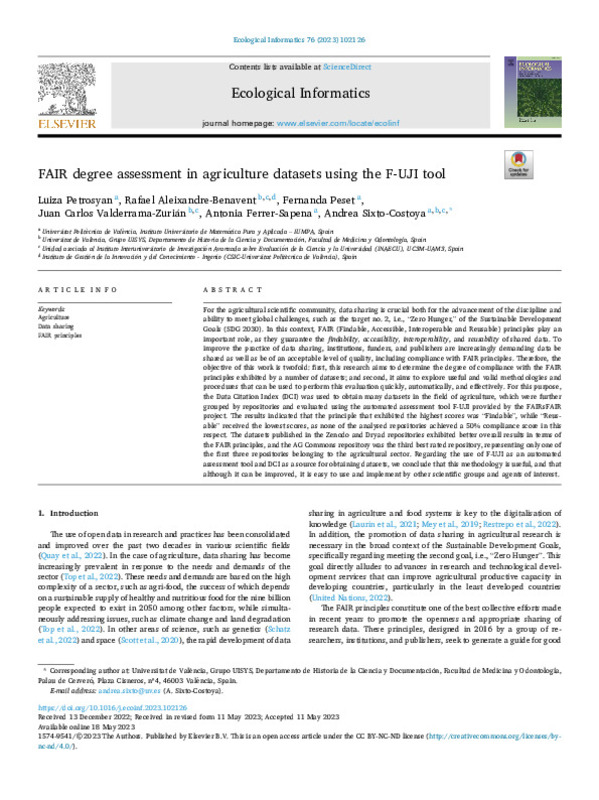|
Resumen:
|
[EN] For the agricultural scientific community, data sharing is crucial both for the advancement of the discipline and ability to meet global challenges, such as the target no. 2, i.e., ¿Zero Hunger,¿ of the Sustainable ...[+]
[EN] For the agricultural scientific community, data sharing is crucial both for the advancement of the discipline and ability to meet global challenges, such as the target no. 2, i.e., ¿Zero Hunger,¿ of the Sustainable Development Goals (SDG 2030). In this context, FAIR (Findable, Accessible, Interoperable and Reusable) principles play an important role, as they guarantee the findability, accessibility, interoperability, and reusability of shared data. To improve the practice of data sharing, institutions, funders, and publishers are increasingly demanding data be shared as well as be of an acceptable level of quality, including compliance with FAIR principles. Therefore, the objective of this work is twofold: first, this research aims to determine the degree of compliance with the FAIR principles exhibited by a number of datasets; and second, it aims to explore useful and valid methodologies and procedures that can be used to perform this evaluation quickly, automatically, and effectively. For this purpose, the Data Citation Index (DCI) was used to obtain many datasets in the field of agriculture, which were further grouped by repositories and evaluated using the automated assessment tool F-UJI provided by the FAIRsFAIR project. The results indicated that the principle that exhibited the highest scores was ¿Findable¿, while ¿Reusable¿ received the lowest scores, as none of the analysed repositories achieved a 50% compliance score in this respect. The datasets published in the Zenodo and Dryad repositories exhibited better overall results in terms of the FAIR principles, and the AG Commons repository was the third best rated repository, representing only one of the first three repositories belonging to the agricultural sector. Regarding the use of F-UJI as an automated assessment tool and DCI as a source for obtaining datasets, we conclude that this methodology is useful, and that although it can be improved, it is easy to use and implement by other scientific groups and agents of interest.
[-]
|
|
Código del Proyecto:
|
info:eu-repo/grantAgreement/AEI/Plan Estatal de Investigación Científica y Técnica y de Innovación 2017-2020/PID2019-105708RB-C21/ES/SP1: DATAUSE STABLE METHODOLOGIES TO EVALUATE AND MEASURE QUALITY, INTEROPERABILITY, BLOCKCHAIN AND REUSE OF OPEN DATA IN THE AGRICULTURAL FIELD/
info:eu-repo/grantAgreement/AEI//PRE2020-092585//SP1: DATAUSE STABLE METHODOLOGIES TO EVALUATE AND MEASURE QUALITY, INTEROPERABILITY, BLOCKCHAIN AND REUSE OF OPEN DATA IN THE AGRICULTURAL FIELD/
|
|
Agradecimientos:
|
The authors would like to thank the grant PID2019-105708RB "Stable methodologies to evaluate and measure quality, interoperability, blockchain, and reuse of open data in the agricultural field: DATAUSE" funded by ...[+]
The authors would like to thank the grant PID2019-105708RB "Stable methodologies to evaluate and measure quality, interoperability, blockchain, and reuse of open data in the agricultural field: DATAUSE" funded by MCIN/AEI/10.13039/501100011033; the pre-doctoral grant (PRE2020-092585) of LP; and the postdoctoral grant (MS21-020) of ASC.
[-]
|









